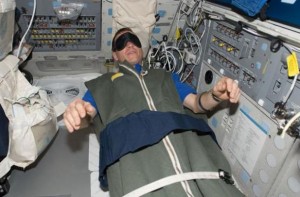Choose a Wake-up Song for Alumni Astronauts
-
-
slice.mit.edu
Filed Under
Recommended

Imagine you're an astronaut zipped in a sleeping bag and strapped to the wall of a space shuttle. (For the moment, put aside the question of how you fall asleep in the first place.) How do you wake up? Natural light? A maniacal alarm clock, or a swift poke in the ribs ? Nope, it's the wake-up song, which has been a NASA tradition since the 1960s.
The wake-up selections are piped in via mission control to "promote a sense of camaraderie and esprit de corps among the astronauts and ground support personnel," explains an entry on NASA's website. Historically chosen by flight controllers or by crewmembers' friends and family members, NASA recently started asking the public to take part--which means you, member of the public, can submit an original composition and/or help choose what mission crew members--including MIT alumni Mike Fincke and Greg Chamitoff--wake up to. Both Fincke '89 and Chamitoff PhD '92 are mission specialists for the upcoming STS-134 mission, set to launch April 19.
In anticipation of the mission, the NASA Space Rock Committee has narrowed a list of 1350 original songs to 10 finalists that you can vote on. They include:
Boogie Woogie Shuffle "A playful road song and interpretation of a childhood dream of being an astronaut," by Savannah College of Art & Design student Ryan McCullough.
Dreams You Give A song that "outlines all the ways that NASA and the shuttle program have impacted the lives of different groups of Americans," by members of the Missouri-based Plunkett family.
Endeavour, It's a Brand New Day A piece seemingly inspired by shuttle launches, by Cocoa Beach resident Susan Rose Simonetti.
Cast your vote by April 19 at https://songcontest.nasa.gov/toporig.aspx.
Learn more about mission STS-134: http://www.nasa.gov/mission_pages/shuttle/shuttlemissions/sts134/index.html
And read a somewhat dated NASA article about space sleep: Wide Awake in Outer Space







